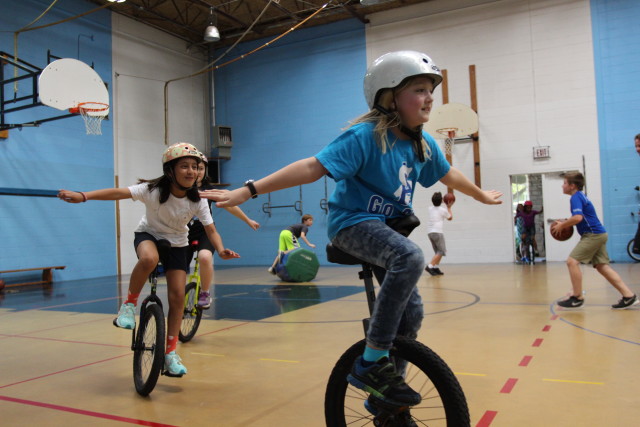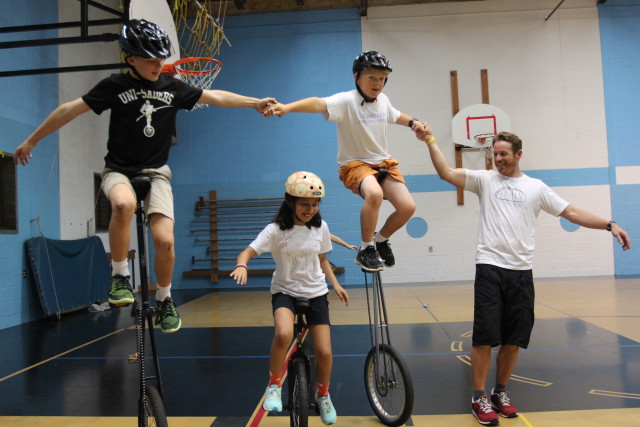Where There’s a Wheel, There’s a Way
By Anna Casey
Reporting Texas

St. Andrew’s lower school students take a ride around the gym during their weekly after-school unicycling club. Anna Casey/Reporting Texas
For Reporting Texas
St. Andrew’s lower school students take a ride around the gym during their weekly after-school unicycling club. Anna Casey/Reporting Texas
Jimmy Agnew didn’t learn to ride a unicycle until he was 28 years old. Now, the founder of the Austin organization One Wheel Many Children works full time teaching elementary schoolers to unicycle. He believes they learn much more than an obscure skill.
“It’s really not even about unicycling,” said Agnew, now 36. “It’s trying to get the kids to collaborate and develop a growth mindset.”
The former second grade and physical education teacher at St. Andrew’s Episcopal School in Austin says he has taught more than 700 kids in the city something only a small fraction of the world’s population can do. The mission of his organization, which is seeking nonprofit status, is to help communities develop self-sustaining unicycle programs of their own so that children can “grow physically, emotionally, and socially.” The program does this through a play-based, service learning model; once children have mastered the unicycle, their job is to help others learn, too.
Agnew’s idea to ignite a one-wheeled educational revolution began eight years ago, when he decided to buy a unicycle on Craigslist. He recalls he told his St. Andrew’s students, “I can’t ride, but if anyone’s interested in learning, let’s show up on Fridays.”
A group of elementary school students, and even one grandparent, began to show up every Friday after classes for the unicycling club. Enthusiasm spun quickly: A unicycle rack went up between the second and third grade classrooms, “Uni-saders” jerseys were printed and the students graduated from rides around the gym to rides around Lady Bird Lake.
For Agnew, the unicyling club became about much more than just teaching kids to ride on one wheel. The former college basketball player will tell you it’s a team sport that requires kids to offer each other a helping hand before they can ever ride alone. “If they don’t work together, they have zero success,” Agnew said. “It’s about getting them used to failing but then working through it.”
Now, Agnew, who has a degree in kinesiology, hopes to bring the same benefits he saw in the St. Andrew’s kids – confidence, patience and physical fitness – to other communities.
“It was one of those things that just grew and grew and grew,” said Kama Bruce, head of the lower school at St. Andrew’s. Bruce and Agnew met last year to contemplate whether Agnew should continue his teaching career or focus on unicycling with a community service approach.
One Wheel Many Children, which combines 45 minutes of unicycling with a reflective writing activity, now operates at three schools. It is offering a 16-week pilot program at KIPP Communidad, a charter school in East Austin where 90 percent of the students are economically disadvantaged. In the halls of KIPP hang drawings of unicycles done by third-graders with words in each spoke that describe what they learned from the single-wheeled sport: for example, support, patience, trust and courage.
Some are skeptical about the benefits of teaching kids such a challenging and niche activity.
“I hardly believe unicycle is something for everyone,” said David Elkind, professor emeritus at Tufts University and author of “The Hurried Child, The Power of Play and Miseducation.” “I believe it is a very special skill, not appropriate for the majority of children.”
To other experts, the idea of teaching any kind of program that engages young kids in gross motor movement is a good idea.

Jimmy Agnew (right), founder of One Wheel Many Children, helps St. Andrew’s students take turns on the tall unicycle. The former St. Andrew’s Episcopal teacher has taught hundreds of kids to unicycle over the past eight years. Anna Casey/Reporting Texas
“We’ve become overcome with the idea of obesity and fitness,” said Jody Jensen, professor in the Department of Kinesiology and Health Education at the University of Texas at Austin. “But you aren’t going to choose an active lifestyle if you aren’t comfortable moving in your own body.”
We are raising a generation of kids who aren’t as coordinated as older generations, Jensen said. She cites reports from the U.S. Army that new recruits are more injury prone than their parents or grandparents.
“What will translate from a unicycle program is balance adjustment and adjusting as you move over an uncertain environment,” Jensen said. She sees the unicycle program as providing cardiovascular benefits as well as what experts call “movement competence,” which can make it easier for kids to take up other sports or physical activities.
Sabrina Kalmans, 12, hasn’t yet mastered the two-wheeled bicycle but has been unicycling since the second grade, thanks to Agnew. Learning was hard at first, Kalmans says, but she thinks anyone can do it. On a recent Friday, the sixth grade student at St. Andrew’s pedaled around the school gym, playing follow-the-leader with her teammates.
Helping some of the younger students learn to ride is her favorite aspect of the sport. “I like being able to teach it,” Kalmans said.
Dwight Bawcom, 73, is a volunteer with One Wheel Many Children and a grandfather who has unicycled for decades. Kids are eager to try it themselves as soon as he and Agnew unload the miniature unicycles, Bawcom said.
During the Tuesday ride at KIPP, he helped the first-time unicyclers slowly move away from the wall to cycle on their own, proudly helping them count their turns of the wheel. “It’s for all kids,” Bawcom said. “We’ve had some real klutzes.”